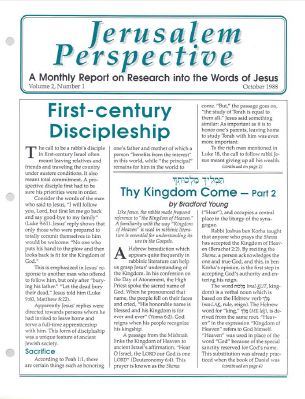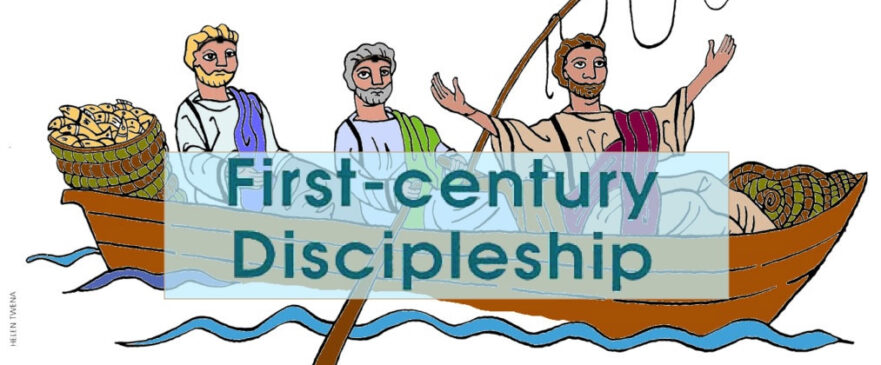The call to be a sage’s disciple in first-century Israel often meant leaving relatives and friends and traveling the country under austere conditions. It also meant total commitment. A prospective disciple first had to be sure his priorities were in order.
Consider the words of the man who said to Jesus, “I will follow you, Lord, but first let me go back and say good-bye to my family” (Luke 9:61). Jesus’ reply shows that only those who were prepared to commit themselves totally to him would be welcome: “No one who puts his hand to the plow and then looks back is fit for the kingdom of God.”
This is emphasized in Jesus’ response to another man who offered to follow him, but only after “burying his father.” “Let the dead bury their dead,” Jesus told him (Luke 9:60; Matt 8:22).
Apparently, Jesus’ replies were directed towards persons whom he had invited to leave home and serve a full-time apprenticeship with him. This form of discipleship was a unique feature of ancient Jewish society.
Sacrifice
According to Mishnah, Peah 1:1, a person “benefits from the interest” in this world from certain things such as honoring one’s father and mother, while “the principal” remains for him in the world to come. “But,” the passage goes on, “the study of Torah is equal to them all.” Jesus said something similar: as important as honoring one’s parents is, leaving home to study Torah with him is even more important.
To the rich man mentioned in Luke 18, the call to follow Jesus meant giving up all his wealth. The price was too high for him and he did not become one of Jesus’ disciples. Peter reminded Jesus that he and the others who had accepted Jesus’ call were different: “We have left everything to follow you.”
“Amen!” said Jesus—in other words, “Yes, you have done that and it is commendable.” Jesus went on to promise that anyone who had made the sacrifice of total commitment for the sake of the kingdom of God would receive something of much greater value than what he had given up, and, in addition, eternal life in the world to come (Luke 18:28-30).
Commitment
Jesus did not want his prospective disciples to have any false expectations and he frequently stressed the need to count the cost before making a commitment to him:
Which of you, if he wanted to build a tower, would not first sit down and estimate the cost to see if he had enough money to complete it? …likewise, any of you who is not ready to leave all his possessions cannot be my disciple. (Luke 14:28-33)
Jesus was clear about the degree of commitment that was required of a disciple:
If anyone comes to me and does not hate his father, mother, wife, children, brothers, sisters, and himself as well, he cannot be my disciple. Whoever does not bear his cross and follow me cannot be my disciple. (Luke 14:26-27)
In this context, the word “hate” does not carry the meaning it normally has in English usage, but seems to be used in a Hebraic sense. In Hebrew, “hate” can also mean “love less” or “put in second place.” For example, Genesis 29:31 states that Leah was “hated,” but the context indicates that Leah was not unloved, but rather loved less than Jacob’s other wife Rachel. Note that the preceding verse specifically says that Jacob loved Rachel more than Leah.
A second illustration of this particular Hebraic shade of meaning of the word “hate” is found in Deuteronomy 21:15: “If a man has two wives, one loved and the other hated….” Here too, the context shows that the “hated” wife is only second in affection and not really hated in the English sense of the word. Likewise, in Jesus’ statement, he is saying that whoever does not love him more than his own family or even his own self cannot be his disciple.
Jesus also alluded to the rigors of the peripatetic life of a sage when he said, “Foxes have holes and birds of the air have nests, but the Son of Man has nowhere to lay his head” (Luke 9:57-58). The burden Jesus’ disciples had to bear was a heavy one, but not unlike what disciples of other first-century sages had to bear, and would not have been considered extreme by the standards of first-century Jewish society.
Another hardship a disciple could face was being away from his wife. Disciples commonly were single, but since marriage took place at a relatively early age (usually by eighteen according to the Mishnah [m. Avot 5:21]), many disciples had a wife and children. For example, the mother-in-law of one of Jesus’ disciples is mentioned in Luke 4:38. If married, a man needed the permission of his wife to leave home for longer than thirty days to study with a sage (m. Ketuvot 5:6).
Like a Father
Despite the many hardships, nothing compared with the exhilaration of following and learning from a great sage, and being in the circle of his disciples. A special relationship developed between sage and disciple in which the sage became like a father (see my “Call No Man ‘Father'”). In fact, he was more than a father and was to be honored above the disciple’s own father, as this passage from the Mishnah indicates:
When one is searching for the lost property both of his father and of his teacher, his teacher’s loss takes precedence over that of his father since his father brought him only into the life of this world, whereas his teacher, who taught him wisdom [i.e., Torah], has brought him into the life of the World to Come. But if his father is no less a scholar than his teacher, then his father’s loss takes precedence…. If his father and his teacher are in captivity, he must first ransom his teacher, and only afterwards his father—unless his father is himself a scholar and then he must first ransom his father. (m. Bab. Metz. 2:11)
If the thought that someone could ransom his teacher before his own father seems shocking, it is only because we do not understand the tremendous love and respect that disciples, and the community at large, had for their sages.
Similarly, Jesus’ not allowing a prospective disciple to say good-bye to his family before setting out to follow him may seem cruel. However, Jesus’ first-century contemporaries would have seen this as quite reasonable and normal. What Jesus meant would have been perfectly clear to them when he said, “No one can be my disciple who does not hate his father and mother, wife and children, brothers and sisters.”

































































































